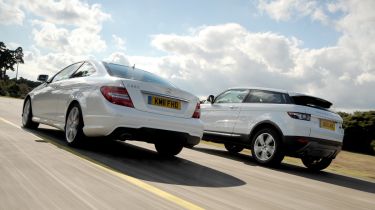Range Rover Evoque Coupe SD4 Prestige vs Mercedes C250 CDI Coupe
Can three-door really match classy, powerful Merc for sporty excitement?
Unexplored sectors of the car market are few and far between, but that hasn’t stopped Range Rover. Its pioneering designers have come up with one of the hottest cars of the year, and the new Evoque Coupe has no direct competitors.
It isn’t for shrinking violets, though, as it attracts the kind of attention usually reserved for Italian supercars. That’s partly down to novelty value, although once this has worn off we’re confident the Coupe will still be one of the most eye-catching cars on the road.
We think the Mercedes C-Class is the most stylish compact executive coupe, and it looks even more low-slung than usual parked next to the tall-riding Evoque. It doesn’t
turn anywhere near as many heads as its rival, but smart AMG details include purposeful alloy wheels and eye-catching headlamps. Despite these features, its attractive curves and sleek profile look utterly conventional beside the Evoque.
The same applies to the interior. The Mercedes is based on the revised C-Class inside, but the overall design is sensible rather than exciting. In contrast, the Evoque has more of a premium feel, thanks to the acres of leather, high-quality switchgear and rotary gear selector. Forward visibility is brilliant, but glance in the rear view mirror and the angled waistline has obvious consequences. Looking at the road behind you through the thin rear screen and side windows is like peering through a letterbox.
Used - available now

2023 Land Rover
Range Rover Evoque
21,916 milesAutomaticPetrol1.5L
Cash £28,500
2021 Tesla
Model 3
30,193 milesAutomaticElectric
Cash £18,800
2023 Tesla
Model 3
55,994 milesAutomaticElectric
Cash £18,000
2023 Mercedes
CLA
36,008 milesAutomaticDiesel2.0L
Cash £21,200Our Coupe was fitted with a pair of individual rear seats. A conventional three-seat bench is available at no extra cost, but wherever family buyers put their children, they’ll struggle to see anything out of the high side windows. Still, there’s plenty of legroom in the back and more headroom than in the Mercedes.
The C-Class is only available with a pair of rear seats, and if you’re after the practical option, the Range Rover is the better choice. Not only is it bigger in the back, but its hatchback tailgate also gives a wider boot opening. And while there’s more luggage space in the Mercedes (it offers 450 litres to the Evoque’s 420 litres), the narrow opening restricts practicality.
Plus, fold the seats and the Range Rover provides an impressive 1,350 litres of space. Of course, practicality isn’t what’s going to decide this test. The driving experience is critical, and the Evoque appears to be at a disadvantage. Its tall body is the last thing you want in a sporty car, but the Range Rover doesn’t feel badly compromised by its SUV roots.
All Evoques come with Land Rover’s clever Terrain Response system as standard. It optimises various functions, including the throttle response and stability control, to suit a range of off-road conditions. Dynamic models include the Adaptive Dynamics package as standard, but on our SD4 Prestige car this is a £1,150 option. It includes a further Dynamic mode, and it gives the Evoque a sportier character by stiffening the suspension and increasing the weight of the steering.
Even without it, the Range Rover drives like a capable hatchback rather than an SUV. Its extra visibility and all-wheel drive traction help to inspire confidence on twisty back roads, and once you get used to the exaggerated nose dive under heavy braking, plus the greater degree of body roll in corners, you’ll have as much fun in the Evoque as in the more composed and capable Mercedes. The 4x4 is also comfortable at low speeds and surprisingly refined on the motorway. For all its talents, though, it has no answer to the pace of the C-Class. The 2.1-litre CDI diesel has the upper hand as it produces 201bhp and 500Nm of torque; the Evoque delivers 187bhp and 420Nm respectively.
To make matters worse, the C250 is offered with the superb 7G-Tronic automatic gearbox. This has quicker, smoother and more intuitive shifts, as well as an extra ratio (and stop-start), giving the Mercedes the edge against the clock. The C250 CDI needed only 7.5 seconds to accelerate from 30-70mph, compared to nine seconds flat for the Range Rover. Its rear-wheel-drive chassis also holds more appeal for keen drivers, and there’s little to choose between the two cars for comfort.
There is a gaping chasm between them when it comes to efficiency, though. In our hands, the Evoque returned only 28.9mpg; the more powerful Mercedes recorded 35.7mpg. That suggests a range of less than 400 miles on a tank in the Evoque, while the C250 CDI should manage more than 500 miles between fill-ups.
On this evidence, the baby Range Rover is the stylish and charismatic choice, but the Mercedes makes more financial sense.







